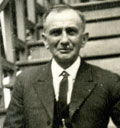
Carl Gregg Doney was born in Columbus, Ohio on July 24, 1867 to a farming family. He paid for his college education at Ohio State University himself, earning a legal degree before deciding to enter the ministry. Doney pastored several churches, and had spent eight years as the president of West Virginia Wesleyan College when he was called to Willamette University. Doney later recounted his first impressions of Willamette and the campuses’ seven buildings as having no architectural harmony and Eaton he described as “serviceable, but reminded one of a half-pretty girl beribboned for a party.” Under his tenure, Waller Hall was re-built after a devastating fire and a new gymnasium and women’s dorm (Lausanne Hall) were constructed. He was the first president freed from the primary charge of teaching and fundraising, which left him physically on campus to focus on day-to-day administration. Under Doney, the College of Liberal Arts’ faculty grew from 15 to 30 and, in 1927, WU received the recognition of the Association of American Universities; however, his strong opinions regarding pedagogy sometimes left faculty feeling hesitant to speak out with opposing views. Doney was also conservative in social matters and did nothing to relax social activities, which he considered a “menace” to scholarship. New rules implemented in 1919 for “varsity women” caused one freshman to burst into verse “In far out west, Willamette school, Midnight fussing became the rule; But things have changed, I scarce know how, For chaperones are the order now.” Doney’s tenure saw a lot of social changes, from World War I to the ushering in of the Great Depression. In 1934, after 19 years of service, he retired to his hometown of Columbus, OH. Doney died in 1955.